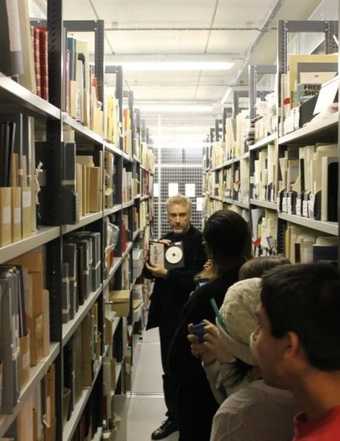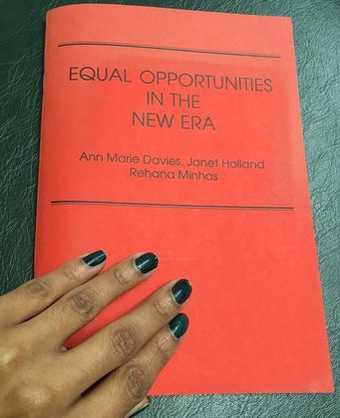
Tate archivist leading a tour of the stores as part of the Archives & Access learning outreach and volunteering programme, exploring how people across the UK might learn and interact with the Tate Archive

Equal Opportunities in the New Era by Ann Marie Davies, Janet Holland and Rehana Minhas
Publication from Panchayat Collection held at Tate
Photo: Michelle Williams Gamaker
As part of Provisional Semantics (one of the eight Towards a National Collection (TaNC) Foundation projects), we are attempting to map and review projects, reports and publications that broadly address the production of cataloguing or object descriptions in the UK cultural heritage sector over the last 10 years or so, with a specific focus on language and cataloguing practice around race, ethnicity and nationality, diversity, decolonisation or inclusion.
This mapping exercise falls into two periods: 2009 to 2019 and 2020 to 2021. The earlier starting point links to the Revisiting Collections initiative. While the project started in 2005, the most recent edition of the Revisiting Collections Toolkit was published by Collections Trust in 2009. Local, regional and national initiatives have been stimulated throughout the sector by particular events and anniversaries such as the 2007 Bicentenary of the Abolition Act or, more recently, the 70th Anniversary of the Windrush in 2018. 2020 has seen an unprecedented level of reaction and discussion in the light of the international outcry of the treatment of Black citizens in the US and UK, the prominence of the Black Lives Matter movement and subsequent public engagement and debate with cultural heritage as a site of colonial control.
The first stage of the research is to capture as many of these projects, initiatives and funding rounds as possible. The second stage is to look at impact and change: what altered practices, procedures and policy (if at all)? What worked, what didn’t and why? The focus is on cataloguing and the description and discussion of art and artefacts.
We would like to hear from colleagues, participants and stakeholders across the sector who have been involved in this type of project, both those with long institutional memories and those trying to make change now.
Please get in touch by emailing research@tate.org.uk.
